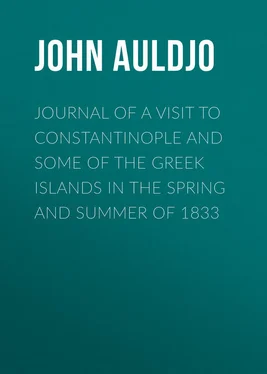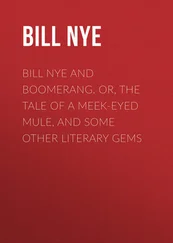John Auldjo - Journal of a Visit to Constantinople and Some of the Greek Islands in the Spring and Summer of 1833
Здесь есть возможность читать онлайн «John Auldjo - Journal of a Visit to Constantinople and Some of the Greek Islands in the Spring and Summer of 1833» — ознакомительный отрывок электронной книги совершенно бесплатно, а после прочтения отрывка купить полную версию. В некоторых случаях можно слушать аудио, скачать через торрент в формате fb2 и присутствует краткое содержание. ISBN: , Жанр: foreign_antique, foreign_prose, Путешествия и география, на английском языке. Описание произведения, (предисловие) а так же отзывы посетителей доступны на портале библиотеки ЛибКат.
- Название:Journal of a Visit to Constantinople and Some of the Greek Islands in the Spring and Summer of 1833
- Автор:
- Жанр:
- Год:неизвестен
- ISBN:http://www.gutenberg.org/ebooks/27484
- Рейтинг книги:3 / 5. Голосов: 1
-
Избранное:Добавить в избранное
- Отзывы:
-
Ваша оценка:
- 60
- 1
- 2
- 3
- 4
- 5
Journal of a Visit to Constantinople and Some of the Greek Islands in the Spring and Summer of 1833: краткое содержание, описание и аннотация
Предлагаем к чтению аннотацию, описание, краткое содержание или предисловие (зависит от того, что написал сам автор книги «Journal of a Visit to Constantinople and Some of the Greek Islands in the Spring and Summer of 1833»). Если вы не нашли необходимую информацию о книге — напишите в комментариях, мы постараемся отыскать её.
Journal of a Visit to Constantinople and Some of the Greek Islands in the Spring and Summer of 1833 — читать онлайн ознакомительный отрывок
Ниже представлен текст книги, разбитый по страницам. Система сохранения места последней прочитанной страницы, позволяет с удобством читать онлайн бесплатно книгу «Journal of a Visit to Constantinople and Some of the Greek Islands in the Spring and Summer of 1833», без необходимости каждый раз заново искать на чём Вы остановились. Поставьте закладку, и сможете в любой момент перейти на страницу, на которой закончили чтение.
Интервал:
Закладка:
FRENCH AND ENGLISH EMBASSIES. The town of Buyukdere, or the deep valley, off which lies the Russian fleet, is also the residence of the Russian, Austrian, and German ambassadors; the very hotbed of plots and etiquette. At Terapia the French and English embassies reside alongside each other; indications of that perfect unanimity which ought to subsist between these two great powers; and, if they remain true to each other, I would confidently back Terapia politics and manœuvres against those of Buyukdere. The French palace is a spacious building, with beautiful and extensive gardens. That inhabited by the English ambassador, on the contrary, is small, comfortless, and with only a small slip of ground.
RUSSIAN MILITARY MUSIC.This day was occupied in visits from the secretaries of embassy of the different missions. As the plague was in Terapia a few days since, that village is put in quarantine with the palace; which also lies under the same regulations in respect to the Actæon: and as the Russian sentinels refused to allow any one to land in the Sultan's valley, we had nothing to do but to watch their drills and parade exercises, while listening to the music of the horn bands, which played on a hill close to our anchorage; and the beauty of these national airs, somewhat compensated for the rudeness with which they turned us off the shore. It was very cold in the afternoon; the shifting of the wind to the north caused a great change in the weather, and towards evening we were glad to keep below.
Thursday, 2d. It is a most lovely morning: all nature seems to rejoice in the freshening breeze, which, blowing from the Black Sea, tempers even the hottest days with its refreshing coolness, and extracts the sweets from millions of roses, which ever bloom on the shores of the Bosphorus. From the jasmine or orange flower, it floats with its odorous burthen along the current, and lays all its perfume at the foot of Stamboul.
THE CAIQUE. A party of us embarked in a sort of light boat called a caique, than which no species of vessel, save the gondola, cuts more softly and noiselessly through the waters. It is a narrow wooden canoe, with a long beak; the outside is painted black, with a strip of bright red inside the stern piece; and is ornamented with carvings of flowers, and a thousand other devices. A Persian carpet, or a piece of oil cloth, covers the part on which the foot steps in entering, and here the slippers are left or retained, as the owner pleases. Those who ride in them do not sit on benches, but in the bottom of the caique, on a Persian carpet. The interior is white as snow, and there is an ornamented back board which runs across, and separates the stepping place from that appropriated to the purpose of a seat. It has no keel, and the paddles are long, and broad at the end. Some caiques are rowed by one, others by two boatmen, with two oars or sculls each; but the most elegant of these vessels have three rowers. The employés of high station about the Porte, and the ministers of the different foreign courts, keep superb caiques, rowed by eight, ten, or even twelve men; but although these boats are very striking in their appearance, they want that air of comfort and neatness which distinguish the smaller caiques.
TURKISH BOATMEN. The rowers are either Greeks or Turks, and wear a fez just large enough to cover the crown of the head, which is close shaved. The remainder of their dress consists of a thin transparent shirt, with large sleeves reaching to the elbows; and cotton drawers fastened to the knees; both as white as snow. They are a fine robust race of men, and their muscular sun-burnt forms are displayed to advantage through the gauze which so slightly covers them. At each stroke they utter a grunt, by forcing the breath suddenly from the chest; to acquire this accomplishment, is considered a necessary part of the boatman's education, and his character depends much upon it.
When we arrived at the landing-place of Tophana, a Turk, splendidly habited, pulled the caique close up with a long pole, and assisted us out; for which service he was rewarded with a few paras. 8 8 These pretty diminutive coins are called dust by the common people; a name not at all inapplicable, as in size they resemble the following mark ◯, and are thin as a gum wafer. A handful of them scarcely equals a shilling in value.
A fountain of singular beauty is here erected in the centre of the fish and vegetable market, which, from its vicinity to the arsenal, and from its being the landing-place for all pleasure boats coming from Scutari and the neighbouring villages of the Bosphorus, is constantly occupied by a crowd of idlers.
In the street leading up to Pera, the throng, which was also considerable, presented an infinite variety of novel and picturesque costume. The pavement is bad, but very clean, and greatly exceeds in this respect the narrow streets of the generality of Italian or Scotch towns. There is no cry of "heads below;" and a man may wander about at night without any fear of other rain than that of heaven, provided he carries a light with him.
PERA. – DESTRUCTIVE FIRE. Pera is recovering but slowly from the destructive fire, which two years ago ravaged this quarter of Constantinople; for, owing to the unsettled condition of public affairs, and the uncertainty as to who may be the future masters of this capital, the rich are unwilling to embark their property in building speculations on any very extensive scale. However, three handsome streets have been finished, the houses of which appear better and more commodiously built than they were formerly. Having secured apartments in a very comfortable lodging-house, kept by one Guiseppino Vitali, we paid a visit to Mr. Cartwright, the consul-general, perhaps one of the most excellent and kind-hearted individuals ever invested with the consular authority. Since the fire, he has built a very comfortable house, where he exercises a generous and unbounded hospitality.
HOSPITALITY OF THE BRITISH CONSUL. From Messrs. Black and Hardy, our bankers in Galata, we also experienced the most friendly attentions. We thence proceeded to Mr. Stampa's, that emporium of all good condiments, where Adrianople tongues, Yorkshire bacon, Scotch whisky, French cogniac, Scotch ale, London porter, English cheese, and Havannah segars may be obtained for "a consideration." In fact, no shop can be supplied with a greater variety of articles, nor in any city upon the surface of the globe are luxuries, whether foreign or domestic, to be obtained more plentifully than in Stamboul. Returning to Guiseppino, we dined at the Europa, a good inn – at least, we had a good dinner; and as evening advanced, proceeded to Tophana, and after a two hours' pull up the Bosphorus, we arrived at the ship. The current runs so strong, that the boats are obliged to keep in close to the shore, and at three points are towed by old men and boys, who are stationed there for the purpose, and receive a few paras for their labour.
Friday, 3d. – To-day it poured with rain without cessation, and in consequence, the ambassador could not go on shore. In the evening I went to the palace for a few minutes, but it felt so cold and comfortless that I had no wish to remain. This is by no means a fit residence for our ambassador. I returned to the ship loaded with newspapers, the appearance of which on the gun-room table was hailed with satisfaction, nearly a month having elapsed since any one on board had heard of the state of home and Europe.
RUSSIAN MILITARY FUNERAL. Saturday, 4th. – This morning a Russian soldier was buried, and we observed the ceremony from the quarter deck. He was borne in an open wooden coffin; a priest in black, and with a long beard, headed the procession, and a company of soldiers brought up the rear. On arriving at the grave, the priest put on an additional garment, having a yellow cross upon it, and then read the service, sprinkling the body at intervals with holy water (as we supposed), for the distance was too considerable to enable us to see distinctly. After each person present had repeated this portion of the ceremony as he walked round the corpse, the priest resumed his duties, scattering more water upon the body, and the lid being put on the coffin, a blessing was pronounced while it was lowered into the grave, and with the casting in of the earth, the ceremony ended. The soldiers then filed up the hill; while the priest, disencumbering himself of his robes, proceeded to saunter about the shore.
Читать дальшеИнтервал:
Закладка:
Похожие книги на «Journal of a Visit to Constantinople and Some of the Greek Islands in the Spring and Summer of 1833»
Представляем Вашему вниманию похожие книги на «Journal of a Visit to Constantinople and Some of the Greek Islands in the Spring and Summer of 1833» списком для выбора. Мы отобрали схожую по названию и смыслу литературу в надежде предоставить читателям больше вариантов отыскать новые, интересные, ещё непрочитанные произведения.
Обсуждение, отзывы о книге «Journal of a Visit to Constantinople and Some of the Greek Islands in the Spring and Summer of 1833» и просто собственные мнения читателей. Оставьте ваши комментарии, напишите, что Вы думаете о произведении, его смысле или главных героях. Укажите что конкретно понравилось, а что нет, и почему Вы так считаете.










![John Bruce - The Lettsomian Lectures on Diseases and Disorders of the Heart and Arteries in Middle and Advanced Life [1900-1901]](/books/749387/john-bruce-the-lettsomian-lectures-on-diseases-and-disorders-of-the-heart-and-arteries-in-middle-and-advanced-life-1900-1901-thumb.webp)

